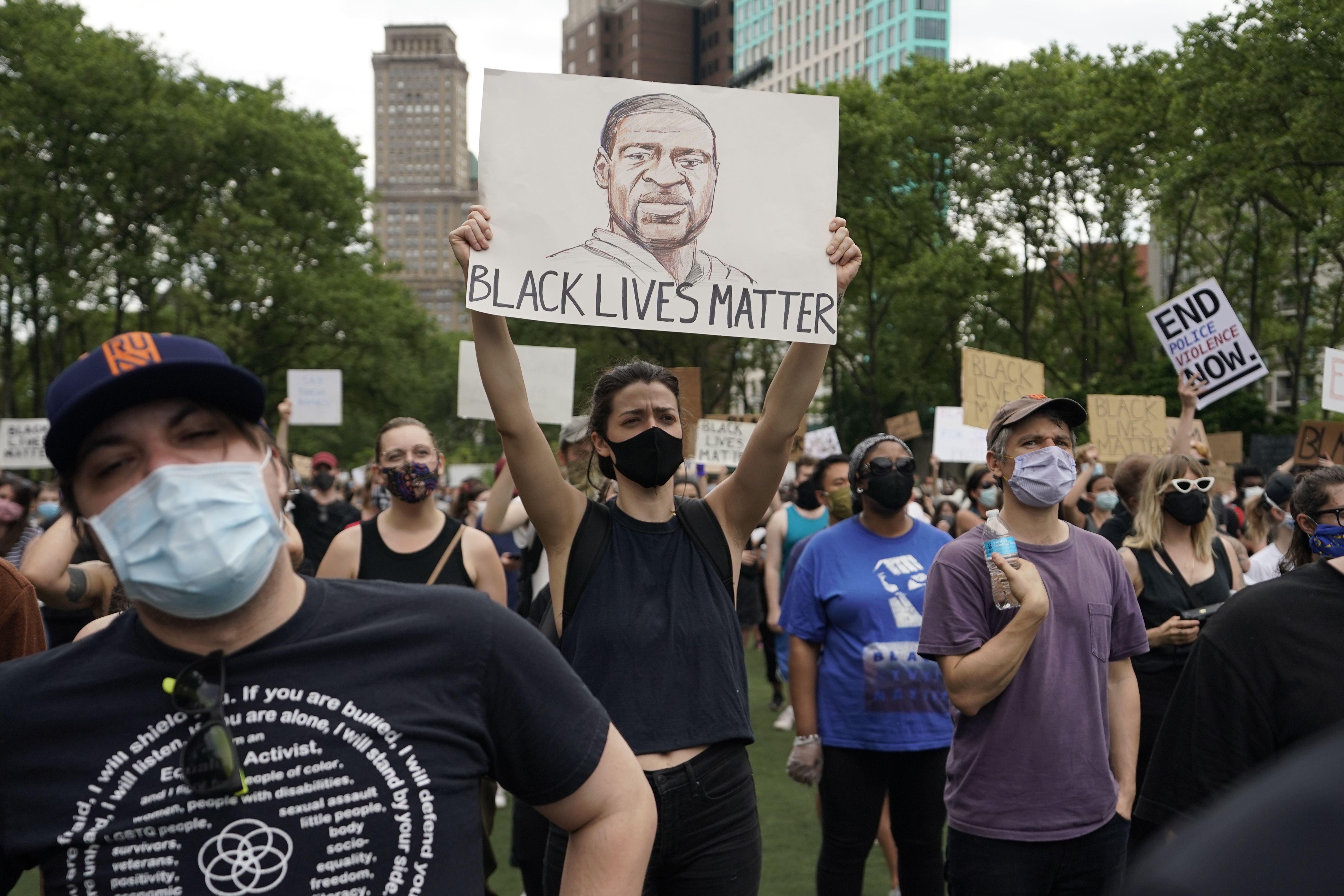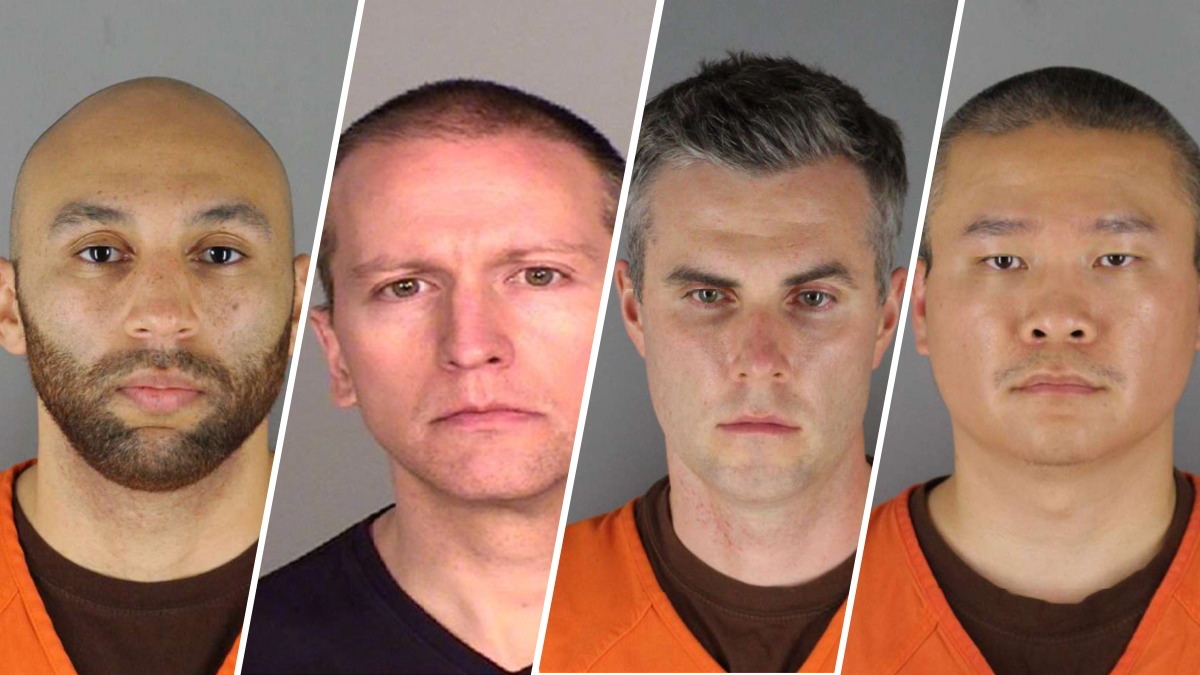What to Know
- Well over 2,000 arrests have been made in NYC over a week of citywide demonstrations in response to the death of George Floyd, a black man who died in Minneapolis police custody on May 25
- The NYC curfew has been extended through Monday, effective daily from 8 p.m.-5 a.m. The partial Manhattan traffic and for-hire vehicle pickup bans are expected to last through end of curfew
- Gov. Cuomo warned Thursday mass protests could turn into "super spreaders" for COVID; he said the state would open up free testing for any protest attendees and urged them to act as if they were exposed
After a full week of protests across New York City, thousands gathered again Thursday for a vigil to honor the life of George Floyd, whose death under the knee of a white police officer sparked demonstrations in all 50 states calling for an end police brutality and racial justice.
Seas of sign-wielding protesters chanting "George Floyd," "No Justice, No Peace" and "Black Lives Matter" joined Floyd's younger brother Terrence Thursday at Cadman Plaza Park in Brooklyn, the borough Terrence Floyd calls home. As they awaited his remarks, they voiced the names of Breonna Taylor and Ahmaud Arbery, whose deaths have contributed to the national unrest.
Later, Terrence Floyd stood at the podium before the demonstrators, silent for nearly two full minutes as the crowd of thousands chanted "you are not alone." He wore a mask imprinted with his brother's photo and the phrase, "We can't breathe," referring both to George Floyd's last words and institutionalized racism that has suffocated the black community for decades.
Get Tri-state area news and weather forecasts to your inbox. Sign up for NBC New York newsletters.
"Movements going on all over the world, I feel so good knowing my borough, my borough ... I thank God for you all showing love to my brother," Terrence Floyd said. "I'm proud of the protests, but I'm not proud of the destruction. My brother wasn't about that."
He repeated that phrase for emphasis, adding, "My brother wasn't about that. Brooklyn -- trouble don't last always. Power to the people. Not just my people. Not just your people. I'm talking about power to the people -- all of us."
Terrence Floyd then led the demonstrators — estimates had the crowd size around 5,000 by late afternoon — on a somber march across the Brooklyn Bridge to Foley Square later Thursday. Bill de Blasio and his wife Chirlane McCray were expected to join the march across the span, but the mayor was met with audible boos and chants of "de Blasio go home" and "resign" when he arrived at Cadman Plaza with the first lady, and cut his comments short.
A Floyd family spokesman welcomed the couple to the podium, urging the crowd to replace their boos with chants of "respect." Many seemed to briefly oblige.
"George Floyd cannot have been allowed to die in vain," de Blasio said. "For all of us who know white privilege, we have to do more because we don't even fully recognize the daily pain that racism in this society causes. We will make peaceful change. To the Floyd family, we stand with you. Black Lives Matter in this city. Black Lives Matter in America."
The huge crowd of protesters slowly marched from Brooklyn over to Manhattan, going past Foley Square and through SoHo before ending at Washington Square Park, with other offshoots with hundreds of protesters at gathering at places like Union Square.
At the same time, mourners in Minnesota were remembering George Floyd with a memorial service and funeral. More Floyd family members joined with activists like Rev. Al Sharpton as they called for justice, and remembered their loved one. Gov. Andrew Cuomo called for a statewide moment of silence at 2 p.m. in New York to coincide with the beginning of that.
George Floyd's Death Sparks National Unrest
Earlier this week, Terrence Floyd made another emotional appeal for nonviolence at the site in Minneapolis where his brother died, saying, "That’s not going to bring my brother back at all." He wore the same mask he donned at Cadman Plaza Park Thursday, which was the same site where tempers flared after curfew the night before.
Videos shared by New York City Public Advocate Jumaane Williams showed police officers forcibly breaking up the march and making scores of arrests. Williams said it was a "nonviolent protest," but officers said they were enforcing the mayor's curfew, which remains in effect from 8 p.m. through 5 a.m. daily through Monday morning.
The confrontation turned physical at times, featuring shoving matches between cops and protesters. Once the demonstration was broken up, Williams went after de Blasio for having the police enforce the "ill-advised curfew," saying the whole tense standoff was "completely avoidable."
"All the riot police start pushing, shoving, batoning. I'm like, 'What is happening? Why are we doing this?'" Williams said. "People start talking about the mayor's curfew. Last night, I saw things I never saw before. Literally people holding signs, backing up, getting wailed on. The police were screaming 'mayor's curfew.'"
Williams added on Thursday that Cuomo and de Blasio were "taking a playbook from Donald Trump on how to respond to these protesters."
The organized protests on Thursday ended before the city's curfew went into effect at 8 p.m. for the third straight night, but there were still crowds of hundreds who marched along the streets of New York City well into the night. Video on social media showed crowds of hundreds marching in Crown Heights and another group taking a knee at Barclays Center, with some challenging NYPD officer to join them — but they remained standing.
Another group of around 200 peacefully marched through midtown Manhattan, before running into a large police presence outside the Plaza Hotel. A large number of protesters ran into nearby Central Park, while nearly two dozen arrests had been made by the NYPD.
De Blasio has been criticized from all sides, blamed for the policing policies that led to the protests as well as for the violent unrest that came after. NYC Councilmember Eric Ulrich (R-Queens) on Thursday said he would call for a vote of no confidence in the mayor and his removal from the office.
De Blasio acknowledged Thursday that there were some "horrible moments" in New York City the night before, but said, "What we saw overwhelmingly was peaceful protest."
"I am duly elected mayor. I have put this curfew in place based on the circumstances we have dealt with," he added. "It takes some respect on all sides. If officers say, 'Now is the time we need you to go home,' it's time to go home."
Cuomo also came to the NYPD's defense when asked about videos of cops swinging batons and tackling people violating curfew.
"That is a hyper-partisan rhetorical attack. Police bludgeon peaceful protesters for no reason — that's not a fact. They don't do that," the governor said.
De Blasio has credited the curfew and partial Manhattan traffic ban he imposed with helping curb late-night violence over the last few days of protest. The curfew's first night on Monday was a failure by all accounts; looters ravaged full blocks in the Bronx and destroyed dozens of stores in Manhattan. Seven hundred people were arrested. The next night, Tuesday, was markedly improved with significantly fewer reports of looting and violence, though another 200 were taken into custody. That number was halved Wednesday when nearly 100 protesters were arrested. Again, there was no widespread violence.
In total, more than 2,000 people, including the mayor's own daughter, have been arrested amid the New York City protests that started a week ago Thursday. More than a dozen protests are planned citywide over the course of the day.
Thursday's Brooklyn prayer vigil for Floyd comes a day after prosecutors announced upgraded second-degree murder charges for the now-fired Minneapolis officer who put his knee on Floyd's neck for nearly 9 minutes. Officials also announced Wednesday that the three other officers present when Floyd died had been charged with aiding and abetting murder.
State Attorney General Letitia James, who is expediting an independent review of NYPD actions during the local protests, also spoke at the Brooklyn vigil. She was also asked by Gov. Cuomo to look into Wednesday night's incidents in Brooklyn as part of her investigation. Several clergy members, community activists and other officials were also in attendance.
Ahead of the memorial and march Thursday, which included several clergy members, community activists and other officials, de Blasio said it "marks a moment to recognize the pain that has caused so much concern, so much of an outpouring of a deep, deep desire for change. It is also a reflection point. If we're going to make changes we have to do it together and we have to do it in peace."
The New York City Council has moved to take action against police brutality locally amid the protests. They say a bill to criminalize the use of chokeholds by the NYPD has enough support to override any potential veto from the mayor. It was one of those police chokeholds that claimed the life of Eric Garner on a Staten Island street corner in 2014. Garner's dying words -- "I can't breathe" -- became the initial rallying cry of the Black Lives Matter movement, a desperate phrase that galvanized national demonstrations again as George Floyd uttered it May 25 just before his death under the knee of a white police officer.
Protesters, Enraged by Black Americans Killed, Gather Nationwide
The protests involving tens of thousands across the country have turned deadly in some cities. They come amid the backdrop of the coronavirus pandemic, which has killed more than 100,000 people in the United States and nearly 25,000, at least, in New York alone. Black and Latino people have died at higher rates than the general population across America and in New York City, which accounts for nearly a fifth of all coronavirus deaths in the country.
Cuomo and de Blasio have both expressed concern mass protests could exacerbate COVID-19 in New York City just before its long-awaited reopening. Cuomo warned Thursday the protests could turn into "super spreaders." He said the state would open free COVID testing to anyone who has attended any of the protests and urged people to take advantage of that.
"If you were at one of those protests, I would assume that you were infected," Cuomo said, reiterating he stands with protesters in their outrage. "Tell people, when you go home, tell your parents, tell your sister, tell your brother, tell people, 'I may have been exposed.' And act like you may have been exposed.' Worry about your 60-year-old parent or uncle or aunt. They can die from this virus."



